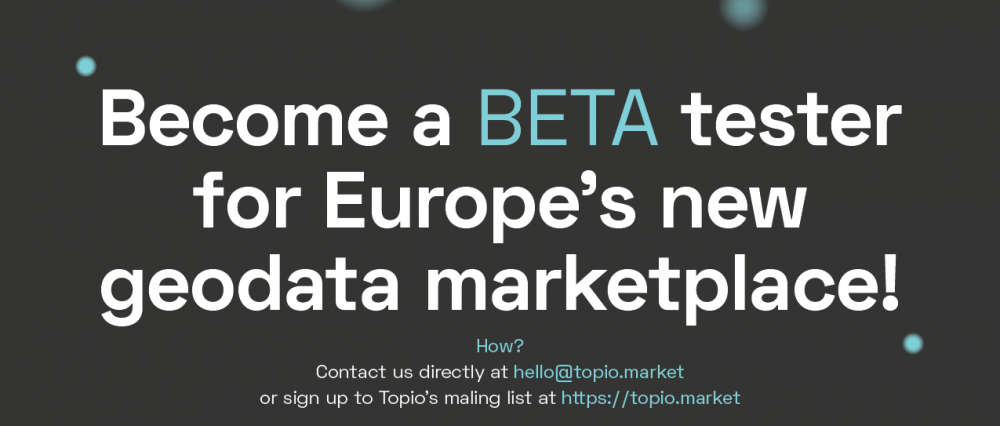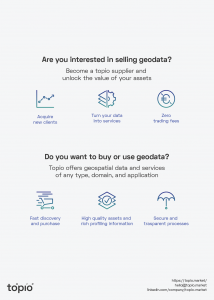The Second Topio Testimonial With The European Commission Is Out!
03—Jun—2022, by Intza Balenciaga

Meet Federico Milani, Deputy Head of Unit for the Data Policies and Innovation Unit of the CONNECT Directorate General, European Commission.
Mr Milani has many years of experience as a project officer and as Deputy Head of Unit for the Creativity Unit, responsible for supporting the creative industry sectors and the Europeana project, since 2008. In addition, Mr. Milani’s studies comprise a PhD in neural networks and intelligent systems, and a degree in electronic engineering. Ms. Kathrin Lenvain, Business Development at AZO, and Intza Balenciaga, Project Manager at AZO, spoke with him about the political influence of Europe’s new geospatial marketplace and how this will help to build trust amongst data sellers, buyers, and users. Don’t miss the interview below, hot off the press!
-
The European Parliament just recently – in April 2022 – approved the new Data Governance Act proposed by the Commission. Why can Europe be proud of this achievement and how will it have an impact on the future digital markets landscape in Europe?
The economic and societal potential of data use is enormous: it can enable new products and services based on novel technologies, make production more efficient, and provide tools for combatting societal challenges. In the area of health, for example, data contributes to providing better healthcare, improving personalised treatments and helping to cure rare or chronic diseases.
To realise this enormous potential, more data must be made available, shared with confidence and be technically easy to reuse. The data governance regulation will ensure Member States’ actions on data are aligned to create a true single European market for data, and to support the development of common European data spaces.
-
What will the impact of the Data Governance Act be across the European Union?
The regulation on data governance will be a powerful driver of innovation and new jobs. It will allow the EU to ensure that it is at the forefront of the second wave of innovation based on data. Society as a whole will benefit from more evidence-based policies and better solutions to societal challenges, such as climate change and the COVID-19 pandemic.
Businesses will benefit from a reduction in costs for acquiring, integrating and processing data, and from lower barriers to enter markets. They will also see a reduction in time-to-market for novel products and services. This will enable small and large firms alike to develop new data-driven products and services.
-
What is the purpose of common European data spaces?
European data spaces will allow data from across the EU, both from the public sector and businesses, to be exchanged in a trustworthy manner and at a lower cost, thereby boosting the development of new data-driven products and services. Data spaces are composed of both the secure technological infrastructure and the governance mechanisms.
The Commission will support the set-up and development of common European data spaces, as well as data use between them, in several strategic domains, as set out in the February 2020 data strategy: health, environment, energy, agriculture, mobility, finance, manufacturing, public administration and skills.
The necessary funding will come from the Digital Europe programme and the Connecting Europe Facility. In particular, the Commission plans to foster the development of data processing infrastructures, tools, architectures, and mechanisms for data sharing.
-
In the framework of the Horizon 2020 programme, the European Commission supports an Innovation Action that builds a commercial marketplace for geospatial data called Topio.market. Why does the European Commission support projects like this and why is it politically important to set up digital European marketplaces and data spaces?
Many companies currently fear that sharing their data would imply a loss of competitive advantage and represent a risk of misuse. Trusted providers of data-sharing services (so-called data intermediaries, such as data marketplaces) will pool and organise data neutrally to increase trust. To ensure this neutrality, the data-sharing intermediary cannot exchange the data for its own interest (e.g., by selling it to another company or using it to develop its own product based on this data) and will have to comply with strict requirements to ensure this neutrality. Both stand-alone organisations that only provide data-sharing services and companies that offer data-sharing services in addition to other services will be allowed. In that case, the data-sharing activity will be strictly separated from other data services. The data and metadata acquired can be used only to improve the data-sharing service.


Did you enjoy this interview? Anyone interested in Topio can test and explore Europe’s new geospatial data marketplace to trade, purchase and use geospatial data whenever you want and wherever you are! Contact us directly at hello@topio.market or/and sign up to the Topio mailing list to get the latest news as soon as the public beta phase starts this summer!





